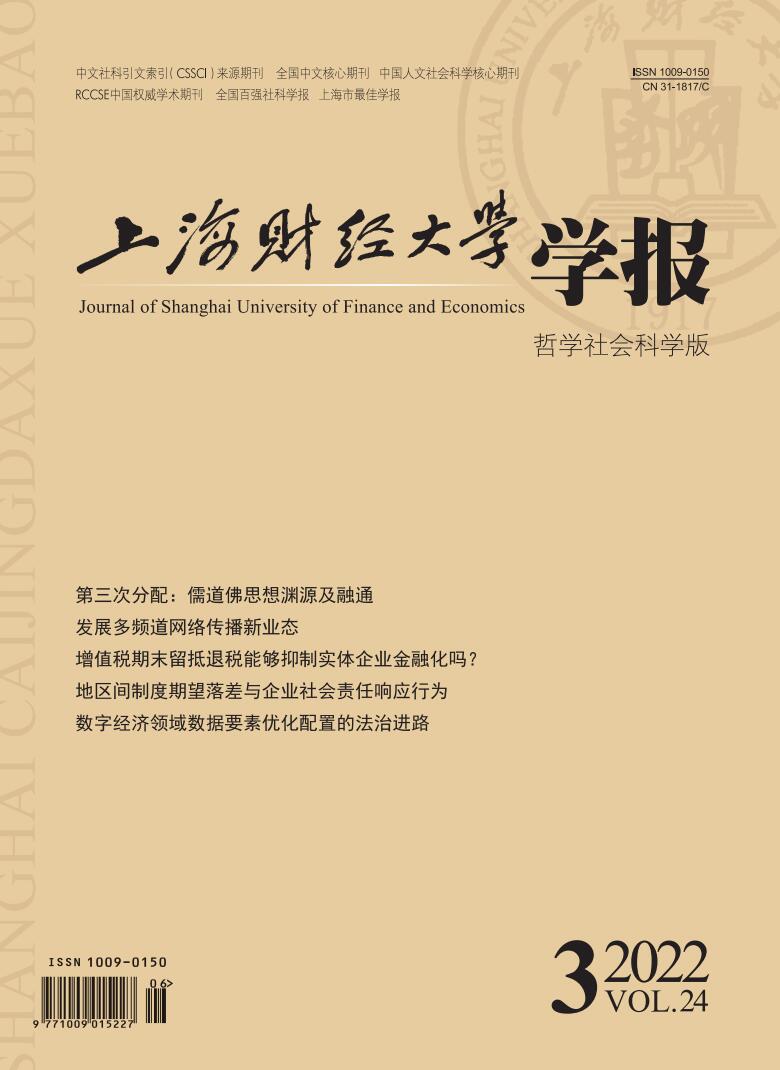制度环境对企业战略行为的影响备受关注。文章结合制度理论和企业行为理论的逻辑框架,将企业所在地区的实际制度发展水平低于同行业其他企业所在地区的制度期望水平的差距,界定为地区间制度期望落差,基于此,探讨了企业在面临地区制度期望落差时的社会责任响应行为。研究表明:地区制度期望落差困境促使企业通过增强社会责任战略响应程度降低不确定性,释放良好声誉信号和构建社会网络,以此应对制度不均衡带来的相对制度空隙。进一步,当面对地区制度期望落差时,企业通过模仿同行业领先企业社会责任行为降低不确定性与成本,同行业领先企业较高的社会责任水平将强化制度期望落差与企业社会责任之间的正向关系;分析师关注度通过提升社会责任战略的有效性增强管理者动机,从而强化制度期望落差与社会责任之间的正向关系;充足的资源禀赋则会增强制度期望落差困境下企业实施社会责任战略的资源能力,由此强化了二者之间的正向关系,而较高程度的绩效期望落差则起到相反作用。文章尝试结合中国转型制度背景的特殊性,从地区制度期望视角透析企业非市场战略的决策动机及影响机制,拓展了企业行为理论在中国转型制度背景下的研究边界。
地区间制度期望落差与企业社会责任响应行为——基于中国上市公司的经验分析
摘要
参考文献
4 何轩, 马骏. 被动还是主动的社会行动者?——中国民营企业参与社会治理的经验性研究[J]. 管理世界,2018,(2). DOI:10.3969/j.issn.1002-5502.2018.02.001
5 李新春, 肖宵. 制度逃离还是创新驱动?——制度约束与民营企业的对外直接投资[J]. 管理世界,2017,(10). DOI:10.3969/j.issn.1002-5502.2017.10.005
6 李雪灵, 蔡莉, 龙玉洁, 等. 制度环境对企业关系构建的影响: 基于中国转型情境的实证研究[J]. 南开管理评论,2018,(5). DOI:10.3969/j.issn.1008-3448.2018.05.009
11 沈洪涛, 苏亮德. 企业信息披露中的模仿行为研究——基于制度理论的分析[J]. 南开管理评论,2012,(3). DOI:10.3969/j.issn.1008-3448.2012.03.004
14 谢佩洪, 何晓光, 阎海燕. 企业非市场战略理论体系及其内在主导机制研究[J]. 管理学报,2010,(2). DOI:10.3969/j.issn.1672-884X.2010.02.019
16 Brinkerink J, Rondi E. When can families fill voids? Firms’ reliance on formal and informal institutions in R&D decisions[J]. Entrepreneurship Theory and Practice,2021,45(2):291–318. DOI:10.1177/1042258719899423
17 Cyert R M, March J G. A behavioral theory of the firm[M]. Englewood Cliffs: Prentice-Hall, 1963.
18 Davis D. Anxious wealth: Money and morality among China's new rich[J]. The China Quarterly,2014,219:866–867. DOI:10.1017/S0305741014000800
19 Davis L E, North D C. Institutional change and American economic growth[M]. Cambridge: Cambridge University Press, 1971.
20 DiMaggio P J, Powell W W. The iron cage revisited: Institutional isomorphism and collective rationality in organizational fields[J]. American Sociological Review,1983,48(2):147–160. DOI:10.2307/2095101
21 Doh J, Rodrigues S, Saka-Helmhout A, et al. International business responses to institutional voids[J]. Journal of International Business Studies,2017,48(3):293–307. DOI:10.1057/s41267-017-0074-z
22 Doh J P, Howton S D, Howton S W, et al. Does the market respond to an endorsement of social responsibility? The role of institutions, information, and legitimacy[J]. Journal of Management,2010,36(6):1461–1485. DOI:10.1177/0149206309337896
23 Du S L, Bhattacharya C B, Sen S. Maximizing business returns to corporate social responsibility (CSR): The role of CSR communication[J]. International Journal of Management Reviews,2010,12(1):8–19. DOI:10.1111/j.1468-2370.2009.00276.x
24 Finkelstein S, Hambrick D C. Top-Management-Team tenure and organizational outcomes: The moderating role of managerial discretion[J]. Administrative Science Quarterly,1990,35(3):484–503. DOI:10.2307/2393314
25 Flammer C. Corporate social responsibility and shareholder reaction: The environmental awareness of investors[J]. Academy of Management Journal,2013,56(3):758–781. DOI:10.5465/amj.2011.0744
26 Flammer C, Luo J. Corporate social responsibility as an employee governance tool: Evidence from a quasi-experiment[J]. Strategic Management Journal,2017,38(2):163–183. DOI:10.1002/smj.2492
27 Ge J H, Carney M, Kellermanns F. Who fills institutional voids? Entrepreneurs’ utilization of political and family ties in emerging markets[J]. Entrepreneurship Theory and Practice,2019,43(6):1124–1147. DOI:10.1177/1042258718773175
29 Greve H R. A behavioral theory of firm growth: Sequential attention to size and performance goals[J]. Academy of Management Journal,2008,51(3):476–494. DOI:10.5465/amj.2008.32625975
30 He Y Q, Tian Z L, Chen Y. Performance implications of nonmarket strategy in China[J]. Asia Pacific Journal of Management,2007,24(2):151–169. DOI:10.1007/s10490-006-9030-3
31 Hernández V, Nieto M J. The effect of the magnitude and direction of institutional distance on the choice of international entry modes[J]. Journal of World Business,2015,50(1):122–132. DOI:10.1016/j.jwb.2014.02.002
32 Hillman A J, Hitt M A. Corporate political strategy formulation: A model of approach, participation, and strategy decisions[J]. Academy of Management Review,1999,24(4):825–842. DOI:10.5465/amr.1999.2553256
34 Khan Z, Rao-Nicholson R, Tarba S Y. Global networks as a mode of balance for exploratory innovations in a late liberalizing economy[J]. Journal of World Business,2018,53(3):392–402. DOI:10.1016/j.jwb.2016.10.002
35 Kuusela P, Keil T, Maula M. Driven by aspirations, but in what direction? Performance shortfalls, slack resources, and resource-consuming vs. resource-freeing organizational change[J]. Strategic Management Journal,2017,38(5):1101–1120. DOI:10.1002/smj.2544
36 Levinthal D A, March J G. The myopia of learning[J]. Strategic Management Journal,1993,14(S2):95–112. DOI:10.1002/smj.4250141009
37 Lieberman M B, Asaba S. Why do firms imitate each other?[J]. Academy of Management Review,2006,31(2):366–385. DOI:10.5465/amr.2006.20208686
38 Luo Y D, Wang S L. Foreign direct investment strategies by developing country multinationals: A diagnostic model for home country effects[J]. Global Strategy Journal,2012,2(3):244–261. DOI:10.1111/j.2042-5805.2012.01036.x
41 Shi W L, Sun S L, Yan D Y, et al. Institutional fragility and outward foreign direct investment from China[J]. Journal of International Business Studies,2017,48(4):452–476. DOI:10.1057/s41267-016-0050-z
42 Tashman P, Marano V, Kostova T. Walking the walk or talking the talk? Corporate social responsibility decoupling in emerging market multinationals[J]. Journal of International Business Studies,2019,50(2):153–171. DOI:10.1057/s41267-018-0171-7
43 Van Hoorn A, Maseland R. How institutions matter for international business: Institutional distance effects vs institutional profile effects[J]. Journal of International Business Studies,2016,47(3):374–381. DOI:10.1057/jibs.2016.2
45 Webb J W, Ireland R D, Ketchen D J. Toward a greater understanding of entrepreneurship and strategy in the informal economy[J]. Strategic Entrepreneurship Journal,2014,8(1):1–15. DOI:10.1002/sej.1176
46 Webb J W, Khoury T A, Hitt M A. The influence of formal and informal institutional voids on entrepreneurship[J]. Entrepreneurship Theory and Practice,2020,44(3):504–526. DOI:10.1177/1042258719830310
47 Xu Y H, Zeng G T. Corporate social performance aspiration and its effects[J]. Asia Pacific Journal of Management,2021,38(4):1181–1207. DOI:10.1007/s10490-020-09706-0
引用本文
连燕玲, 李沁, 郑伟伟. 地区间制度期望落差与企业社会责任响应行为——基于中国上市公司的经验分析[J]. 上海财经大学学报, 2022, 24(3): 61-75.
导出参考文献,格式为:





 6307
6307  6316
6316

